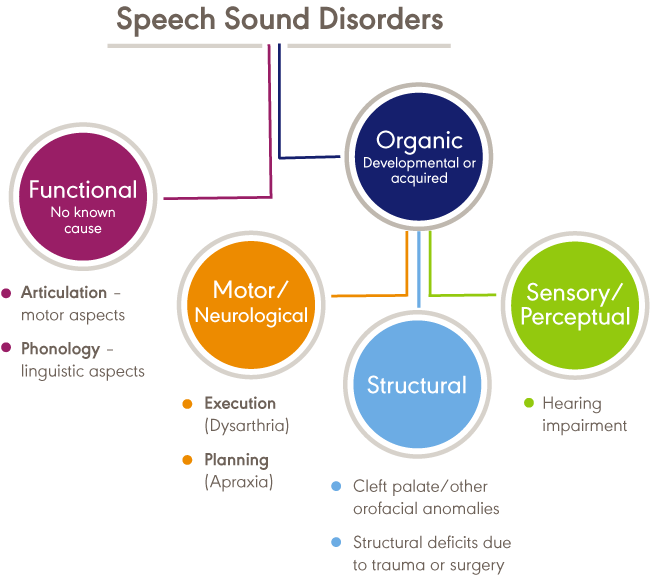Speech
Speech is how we say sounds and words.
Speech Sound Disorders (SSD) is an umbrella term referring to any difficulty or combination of difficulties with perception, motor production, or phonological representation of speech sounds and speech segments.

ARTICULATION
Articulation is the process by which sounds, syllables, and words are formed when your tongue, jaw, teeth, lips, and palate alter the air stream coming from the vocal folds.
Articulation disorder may be defined as difficulty in producing a single or a few sounds with no pattern or derivable rule. Articulation errors are described as:
- Substitution (e.g: ‘wabbit’ for rabbit)
- Omission (e.g: ‘bu_’ for but)
- Distortion (e.g: ‘su’ for shoe)
- Addition (e.g: ‘babanana’ for banana)
A phonological process is a patterned modification of the adult speech system. For example, a phonological process called fronting is when BACK sounds /k/ and /g/ that are produced by the tongue moving up in the back, are replaced with FRONT sounds /t/ and /d/ which are made by the tongue coming up in the front (cake/tate, got/dot, etc).
Dysarthria is a motor speech disorder which occurs when the muscles required to talk are weak due to brain damage. These include muscles in our face, lips, tongue; and throat, as well as muscles for breathing.
Signs of Dysarthria
- Slurred or mumbled speech
- Speech rate is too slow/fast
- Quiet, hoarse or breathy voice
- Sound robotic or choppy
- Not able to move your tongue, lips, and jaw very well
- Have difficulty imitating and saying sounds
- Say the same words differently on different occasions
- Able to say common phrases – like ‘hello’ or ‘how are you?’ without much trouble. This is called automatic speech.
- Move tongue and lips to get them in the right place to try and say the sounds. This is called groping.
- Speak more slowly
- Have difficulty with multi-syllabic words and longer sentences
What To Do?
Contact your speech therapist for a formal assessment
